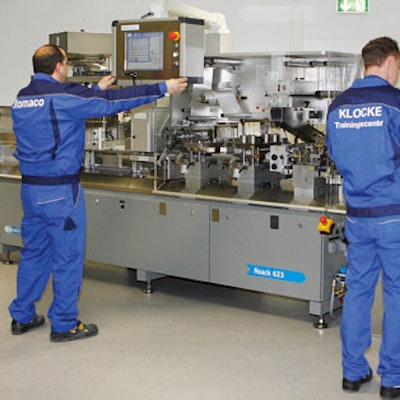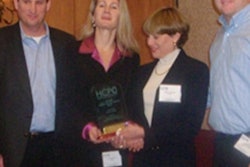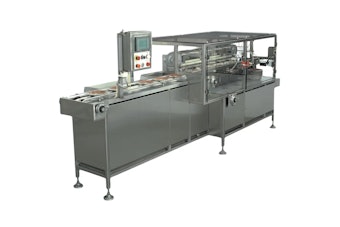Around the globe, contract packagers must be able to quickly accommodate customer product changeovers. KLOCKE Verpackungs-Service GmbH, headquartered in Weingarten, Germany, processes an average of 5,000 packaging orders annually at its two plants in that city. These include primary and secondary packaging of human and animal medicines, cosmetics, dietary supplements, foods, and chemical-technical products. KLOCKE uses blister and multi-component packaging, different peel- and break-off solutions, as well as wallet packaging.
The company services primarily mid-sized customers that require frequent product and packaging changes. Sometimes up to 10 different packaging types are produced from one batch to meet different specifications of the individual target countries. Such demands require efficient product changes, so KLOCKE focuses on optimizing its processes, especially its set-up operations. In a joint training center, KLOCKE employees receive training on how to best work with its blister machines, provided primarily by Romaco.
Training center delivers benefits
In March 2008, KLOCKE opened a joint training center in Weingarten, together with mechanical engineering specialists Romaco Pharmatechnik. Equipped with two blister machines from Romaco Noack, including cartoners by Romaco Promatic, product change and set-up processes are taught weekly by a Romaco technician under production conditions. Each KLOCKE employee receives at least four intensive machine-training sessions per year.
"In this manner, we have been successful in reducing our set-up times in production by 65 percent,” says Dr. Thomas Schreder, managing director of KLOCKE Verpackungs-Service GmbH. "We strive to continually raise the level of our educational training while simultaneously increasing the motivation of our employees.”
Working with Romaco, KLOCKE developed a systematic method for the optimization of set-up times. First, individual workflow of the basic set-up of the blister machine line was analyzed and evaluated segment by segment. Using videotapes, it was possible to continuously improve the processes and formulate the corresponding specifications. In accordance with these instructions, the individual set-up sequences and the correct handling of the tools were studied.
In quarterly sustainability tests, the mechanics and the machine personnel provide proof of their abilities. On average, a set-up operation lasts 45 minutes, with the current best time clocked at 26 minutes. During this time, all formats are exchanged on a cleaned machine; the top and bottom foils are threaded, and the empty blisters are processed. At regular intervals, the practiced set-up operations are also monitored during actual production
Flexible structuring for product changes
During the product change, the machines must be cleared, cleaned, and prepared for new product. These processes are all regulated via Good Manufacturing Practices (GMP) guidelines to provide quality assurance in the manufacture and packaging of pharmaceutical products and foods.
In this way, all processes must be monitored and approved by a third person. For these GMP times alone, an hour must be budgeted on average. Even for the cleaning of a machine in accordance with GMP specifications, at least 60 minutes is required.
In addition, there is the change of format parts, the conveyance of the new product, different test runs, as well as the validation of the individual process parameters. The following applies in general: the more precisely the individual steps are coordinated, the shorter the set-up times. In addition, the current standby status of the necessary machine equipment is a prerequisite for fast delivery times on the part of the contract packaging company.
After orders are received, the different formatting parts must be ordered from the manufacturer of the packaging machine who makes the individual format parts in accordance with the respective product and material specifications. The geographic proximity to Romaco in Karlsruhe, Germany is an advantage for KLOCKE.
"If we ever have a case in which we urgently need certain tool sets for a short-term contract, we can always rely on Romaco,” says Christian Reitze, the contract packager’s manager for production technology. "Both companies support each other with equipment. With technical inquiries, Romaco reacts quickly and without bureaucracy." The usual delivery times for format parts ranges between four to six weeks, though this is frequently undercut when required.
Demanding products require individual solutions
KLOCKE maintains a multitude of different format sets. In order to maintain a manageable variety of tools and to lower the warehouse and acquisition costs, it is advantageous if the format sets can be employed on several machines. The modular construction of the blister machine line of the Romaco Noack offers parts compatibility for its series. KLOCKE has 17 blister machines from Romaco Noack, as well as several cartoning machines from Romaco Promatic. KLOCKE and Romaco have collaborated closely for many years concerning the technological development of the machines.
"The exchange of technical know-how is very important for us,” says Schreder. "Over the years, Romaco has constantly developed its technology while continually adapting to the requests of modern pharmaceutical production. The cooperation begins in the planning phases of new machine concepts, which must be drafted for a new specific contract.”
Using robotics for veterinary blister packs
For the packaging of a substance used to fight parasite infestation in small animals, KLOCKE has implemented a robotics system for the first time. The liquid medicine used for protection against fleas and ticks is filled into pipettes, which employ a special type of blister. These are produced in different packaging sizes and are sealed subsequently in aluminum blisters, then cartoned into folding boxes.
Due to its packaging geometry, the handling of the pipettes is cumbersome, particularly in the filling of the aluminum blisters. Because the bulk product is costly, discards must be minimized. Another challenge is the somewhat small individual contract sizes, which are produced specific to a country.
To keep production costs manageable, KLOCKE needed to develop a dependable line to quickly and flexibly implement product changes. To achieve that, the contract packager decided to integrate robotic systems into the line. These make it possible to achieve short adjustment times because they primarily work without a format and are essentially ready for production at the touch of a button.
“The use of the robot has made it possible for us to make all interfaces continuous and interconnect to one another efficiently,” says Schreder. “Romaco has provided proof once again of its competence in blister lines.”
Three integrated robotic systems
For the packaging of medicine to fight parasite infestation, KLOCKE developed a machine concept with three integrated robotic systems supplied by Romaco. The filled pipettes are first placed into sorted pots. These advance the applications with the top foil side facing upward on a large belt. This is where the pipettes are grasped by two FlexPicker robots and are placed into transportable bowls, so-called product carriers. A camera transmits the exact position of the pipettes to the robotic arm that grabs and positions the product.
Next, the pipette-filled bowls proceed along a shuttle system to the next robotic transfer station where a jointed spider removes the pipettes from the bowls and transfers them to a precooled aluminum blister. In this imbedded form, the pipettes arrive in the twin-width sealing, punch, and perforation stations of the blister machine Noack N 623 with platen sealing.
Blister-packed medicines are then transferred to the synchronized Promatic cartoning machine P 91. Blisters pass through the third robot-driven station of the line in the form of a starwheel that sets the blisters into the bucket chain of the cartoning machine. The unit provides the flexibility to carton either one or two blisters into the carton. The line can achieve an output of up to 80 packages/min.
Robots in the pharmaceutical industry
Robotic systems have provided flexibility for food packaging for some 20 years, with an average of 120 picks/min. However, on pharmaceutical lines, the use of FlexPickers was fairly uncommon. But as the trend has developed towards special packaging solutions, the interest has risen in employing robotics in the pharmaceutical industry. That’s especially the case with small batch production since packaging speed plays a subordinate role. More important is achieving stable production processes within the shortest time, where flexible robotic systems provide an advantage.
Article supplied by Bernd Webel, sales director, Romaco Packaging. For more information, contact [email protected].


























